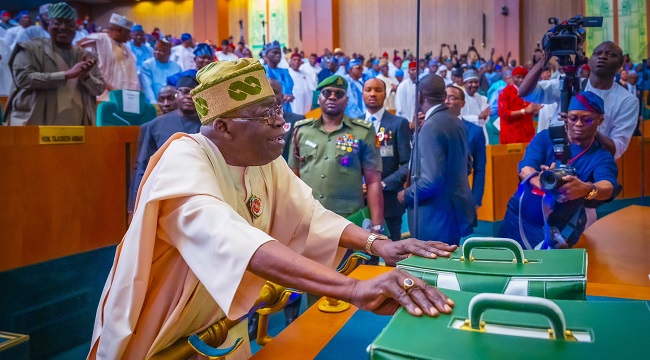The National Assembly has approved the 2025 Appropriation Bill, raising the budget to N54.99tn, with N14.32tn allocated for debt servicing and N13.64tn for recurrent expenditure, covering salaries, overheads, and government operations. While economists and private sector stakeholders acknowledged the budget’s necessity for economic growth, they expressed concerns over its funding sources and potential inflationary impact.
Budget Breakdown and Approval Process
The Senate and House of Representatives passed the budget following the adoption of the Committee of Supply’s report. The lawmakers approved N23.96tn for capital projects aimed at infrastructure growth, with N344.85bn allocated to the National Assembly.
The budget, initially proposed at N54.2tn, saw an increment of N700bn after recommendations by the Appropriations Committees of both chambers. This increase followed President Bola Tinubu’s earlier request to revise the budget from N49.7tn to N54.2tn, citing additional revenue generated by the Federal Inland Revenue Service (FIRS), Nigeria Customs Service, and other government agencies.
According to the revised estimates, statutory transfers will receive N3.655tn, with debt servicing at N14.3tn, capital expenditure at N23.9tn, and a fiscal deficit of N13.8tn.
Key Allocations and Sectoral Investments
President Tinubu’s request for an additional N4.5tn was approved to address critical economic challenges and government development goals. The allocations include:
- Solid Minerals Sector: N1tn
- Bank of Agriculture Recapitalization: N1.6tn
- Infrastructure Projects: N5tn, with N380bn earmarked for irrigation via River Basin Development Authorities
- Road Construction and Rehabilitation: N300bn
- Light Rail Networks in Urban Centres: N400bn
- Border Communities Development: N50bn
- Military Barracks and Aviation: N250bn and N120bn, respectively
Additionally, the National Assembly allocated itself N344.85bn, while the National Judicial Council will receive N521.63bn. Regional development commissions were assigned varying sums, including N626.53bn for the Niger Delta Development Commission and N241bn for the North-East Development Commission. The Independent National Electoral Commission (INEC) was allocated N140bn, surpassing its initial request of N126bn.
Concerns Over Budget Feasibility and Economic Impact
Economists have raised concerns about the budget’s feasibility, particularly its ambitious revenue projections. Johnson Chukwu, Group Managing Director of Cowry Assets Management Limited, warned that the government’s target of producing 2.06 million barrels of crude oil per day is unlikely to be achieved. He cautioned that if the revenue shortfall leads to borrowing from the Central Bank of Nigeria, inflation could worsen.
Similarly, Dr. Ayo Teriba, CEO of Economic Associates, highlighted the risk of insufficient funding for the budget. He noted that while the budget has been passed, its execution depends on revenue collection, warning against repeating the 2024 scenario where budgetary allocations fell short of actual implementation.
On the other hand, Teslim Shitta-Bey, Chief Economist at Proshare, argued that if the funds raised are used effectively, the budget could stimulate economic growth. However, he warned that an increase in deficit spending without real sector growth could heighten inflationary pressures.
Private Sector Perspectives
The Organised Private Sector (OPS) provided mixed reactions to the budget. Gabriel Idahosa, President of the Lagos Chamber of Commerce and Industry, praised the budget as a step towards achieving Tinubu’s $1tn economy target but acknowledged that more efforts are needed.
Dr. Ikenna Nwosu of the Nigerian Economic Summit Group raised concerns about the feasibility of the government’s revenue projections, particularly given the current low purchasing power of Nigerians.
Dr. Femi Egbesola, President of the Association of Small Business Owners of Nigeria (ASBON), welcomed the increased budgetary allocations for infrastructure and social investments. However, he urged the government to ensure transparency and avoid over-taxation.
Conclusion
While the 2025 budget aims to drive economic expansion and development, its success hinges on effective revenue generation and prudent fiscal management. Stakeholders have called for strategic implementation to prevent inflationary pressures and ensure the budget translates into real economic gains.
























